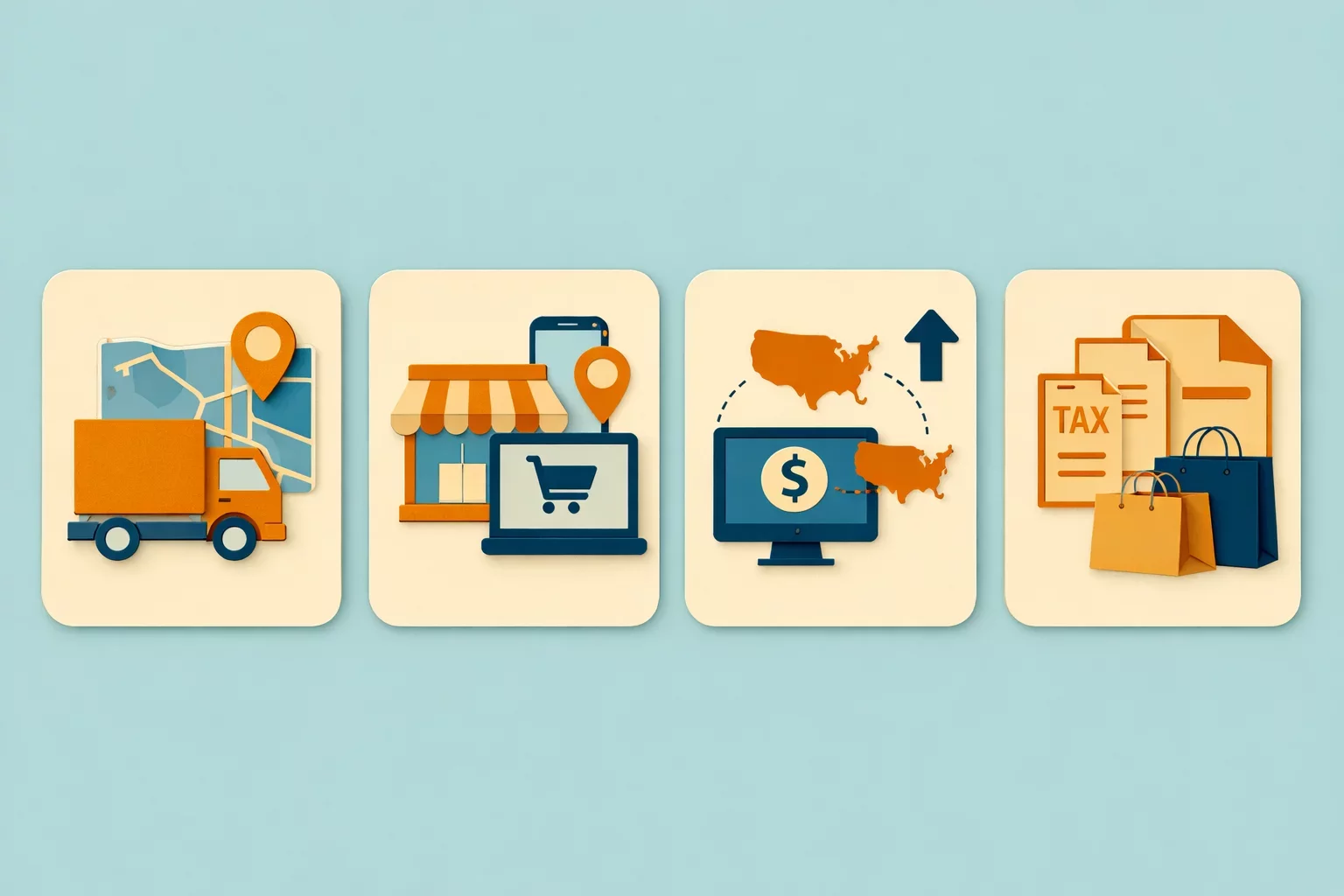Louisiana Sales & Use Tax Guide 2025: Rates & Nexus Rules

Sales and Use Tax Basics in Louisiana
Sales Tax
In Louisiana, the sales tax is ultimately paid by consumers, users, lessees, or recipients of taxable services. However, it is up to sellers or lessors who meet the legal definition of a “dealer” to register for a sales tax, collect the tax from their customers, and file returns with the Louisiana Department of Revenue.
There are several ways for an individual or business to qualify as a dealer, including selling, leasing, or renting tangible personal property or digital products, providing taxable services, holding property in the state for resale, maintaining a business location, operating through sales agents in the state, keeping an inventory for lease or rental, or making deliveries using their own vehicles.
Use Tax
When consumers purchase goods from out-of-state sellers that do not charge Louisiana sales tax, they must pay the consumer use tax directly to the Louisiana Department of Revenue. This system ensures fair competition between in-state and out-of-state retailers, contributing to a balanced and equitable tax structure.
Louisiana Sales and Use Tax Rates
Louisiana is among the five US states with the highest combined state and local sales and use tax rates. The state-wide general sales tax rate is 5%. The use tax rate is set at 8.45%, which includes 4% to be distributed by the Department of Revenue to local governments, regardless of whether the actual combined state and local rate in the area is equal to, higher than, or lower than 8.45%.
However, there are various local sales and use tax rates applicable to taxable transactions. Local sales can be found by the so-called city-to-parish index or by the consumer's address. Nevertheless, local sales and use taxes range from 0% to 7%.
Tax-Exempt Transactions
There are several exclusions and exemptions from sales and use tax provided in Louisiana. The Louisiana Department of Revenue publishes the complete list of the exemptions and exclusions. However, some common consumer-related exemptions include food for home consumption, utilities like electricity, natural gas, and water, prescription drugs, and items traded in when purchasing new articles. In addition to these exempt transactions, Louisiana also exempts sales made directly to the federal government and its agencies, sales for resale, and occasional sales.
Nexus Rules in Louisiana
Individuals and businesses may establish a nexus in Louisiana through several different means, including being physically present in the state, selling taxable goods and services to in-state consumers from outside the state, facilitating sales, or having affiliates or persons soliciting their business.
Physical Nexus
Taxable persons are considered to have a physical presence if they engage their own or operate retail spaces, maintain offices, warehouses, or other business locations, have employees or agents operating in the state, or store property in third-party facilities. Sellers with physical presence in the state are classified as dealers, and, consequently, are required to register for, collect, and remit both state and local sales taxes.
Economic Nexus
Economic nexus rules were established in 2020, requiring sellers without physical presence in a state who sell taxable goods and services to local consumers and exceed USD 100,000 in gross revenue or have 200 or more separate transactions to register for sales and use tax purposes within 30 days of exceeding the threshold.
However, Louisiana amended its economic nexus threshold in 2023 by eliminating the transaction threshold, leaving only the USD 100,000 gross revenue threshold relevant for establishing this nexus.
Marketplace Nexus
Similar to the economic nexus, marketplace facilitators may also be liable for sales tax purposes if they establish a marketplace nexus in a state. While the change in rules for the economic nexus only included the removal of the transaction threshold, for marketplace facilitators, the value or amount threshold also changed. Instead of the previous USD 100,000 in gross revenue, marketplace facilitators are liable for sales and use taxes in Louisiana if the value of their retail sales exceeds USD 100,000 in the current or previous year.
Click-Through and Affiliate Nexus
Click through nexus and the affiliate nexus rules were implemented in 2016, broadening the definition of a dealer for sales tax purposes.
Under these nexus rules, any person who solicits business through an independent contractor, affiliate, or other representative in Louisiana and earns a commission, referral fee, or other compensation for referring customers is considered a dealer if their cumulative sales to Louisiana customers exceed USD 50,000 in the previous 12 months. However, this can be challenged if future sales are expected to remain below that threshold.
Additionally, dealers who sell similar products under the same or a similar business name and trademarks as a Louisiana retailer, or who actively maintain a market in Louisiana through agents or affiliates, fall under the scope of these nexuses. Finally, an individual or business that holds a substantial ownership interest, meaning over 5% directly or indirectly, in a retailer with Louisiana sales locations, is considered a dealer liable for sales and use tax purposes.
Taxable Goods and Services in Louisiana
Sales and use tax applies to the retail sale of tangible goods or digital products, as well as their use, consumption, distribution, or storage within the state, including the lease or rental of tangible goods or digital products in Louisiana.
Taxable services include a wide range of activities such as lodging in hotels or cabins, admissions to entertainment or recreational events, parking or storage of vehicles, storage and preparation of property for cold storage, repairs and maintenance of tangible goods, telecommunications, access to prewritten computer software, information services, and cable or satellite television and digital audio services. Notably, cable and satellite services are subject to an additional 5% state tax.
Bundled Transactions and the True Object Test
As is the case in many other US states, in Louisiana, a bundled transaction occurs when two or more distinct and identifiable products are sold together for a single non-itemized price. Generally, bundled transactions are taxable, unless they fall under certain exceptions.
These exemptions apply in cases where the true object of the transaction is a non-taxable service, when the taxable portion is de minimis, meaning that 10% or less of the total price, or when exempt items, such as food, drugs, or medical products, comprise at least half of the bundle. The true object test is a method used to determine the taxability of bundled transactions. It examines the primary purpose of the transaction to determine whether it should be taxed.
E-Commerce Framework
Remote or out-of-state sellers are subject to the same sales and use tax rules and requirements as local dealers if they sell taxable goods, digital products, or services for delivery within the state but do not have a physical presence there. If, during the previous or current calendar year, their gross revenue from these sales exceeds USD 100,000, they are required to register for, collect, and remit taxes in Louisiana.
However, these remote sellers may also make sales through online marketplaces or digital platforms, in which case, there are additional considerations for such sellers.
Marketplace Rules
As a general rule, a remote seller should only include its own direct sales into the state, not sales made through a marketplace, since those count toward the marketplace’s threshold instead. Therefore, if the remote seller's revenue is USD 20,000 through direct sales and USD 80,000 through marketplace sales, it will not be required to register for sales and use tax, as it has not exceeded the economic nexus threshold.
In other words, remote sellers are only liable for direct sales to consumers located in Louisiana, whereas marketplace facilitators are liable for any sales facilitated through their platform. The exemption is provided for large marketplace sellers with annual US sales exceeding USD 1 billion. These marketplace sellers may contract with facilitators to handle their own tax collection and remittance, provided they meet strict registration and reporting requirements.
Digital Goods and Services
As of January 1, 2025, the Louisiana tax base has been expanded to include digital goods that were previously exempt from taxation. While downloaded items such as e-books, games, audiovisual works, and information services were already subject to tax, under the new rules, remotely accessed software (SaaS), digital periodicals, and digital codes that allow access to digital products are subject to sales and use tax, except for gift cards or certificates that can be redeemed for non-digital items.
Additionally, software, access services, information services, and digital products may be exempt if they meet certain conditions. Therefore, if they are exclusively for commercial use, directly tied to producing taxable goods or services, created solely for a business’s internal needs and not for sale, or used by FDIC-insured financial institutions or licensed healthcare providers for specific business purposes, they may be tax-exempt. Additionally, free digital products are not taxable unless bundled with taxable items.
Digital Marketplace
Digital marketplaces that enable sales for a marketplace seller, by listing goods or services for sale in Louisiana, or collecting payments from the buyer and transferring them to the seller, regardless of whether they earn a fee for doing so, through a marketplace they own, operate, or control, are considered digital platform operators, that is marketplace facilitators.
Notably, payment processors that only handle payment transactions, platforms that only provide advertising or listings without handling payments, CFTC-registered trading platforms and their members or brokers, and businesses that facilitate hotel room or rental car bookings, do not fall under the definition of marketplace facilitators.
Those who meet the definition and set criteria for marketplace facilitators are liable for sales and use tax if they exceed the applicable nexus threshold.
Digital Platform Operator
Digital platform operators of marketplaces and facilitators are liable for sales and use tax collection and remittance if in the current or previous calendar year the value of their retail sales exceeds USD 100,000. The 2023 changes in marketplace nexus rules also removed wholesale and resale transactions from the calculation of the marketplace facilitator threshold.
Once they exceed the threshold, marketplace facilitators have 30 days to apply for sales and use tax and begin collecting tax within 60 days of approval. Although the facilitators are responsible for ensuring that taxes are reported and paid correctly, if errors occur due to incorrect information provided by the seller, the facilitator may be relieved of liability for up to 5% of the total tax due, with the seller becoming responsible instead.
Filing and Payment Requirements in Louisiana
Tax returns are generally filed on a monthly or quarterly basis, where the return and payment are due on or before the 20th of the month following the reporting period. There are several ways in which a taxable person may file tax returns, including LaTAP, an online state taxpayer access point, and Parish E-File, an online tool that facilitates the secure electronic filing of state and parish/city sales and use tax returns.
Additionally, taxable persons may download a tax return in a PDF file and mail it to the Louisiana Department of Revenue.
Penalties for Non-Compliance with Sales and Use Tax Requirements
Individuals or businesses that fail to meet tax return filing requirements or tax payment deadlines risk being penalized with 5% of the tax owed, plus an additional 5% for each 30 days the payment remains overdue, with the total penalty limited at 25%. In addition to penalties, an annual interest rate of 11.25% or a daily interest rate of 0.030822% is calculated on any unpaid tax.

Featured Insights

Burkina Faso FEC E-Invoicing Mandatory July 2026
🕝 February 24, 2026More News from United States
Get real-time updates and developments from around the world, keeping you informed and prepared.
-e9lcpxl5nq.webp)






-fd4vrjrcmo.webp)











-qoqtiao7l2.webp)





-o0xyg5unvs.webp)










-sug7vykj81.webp)

















-pofe7ucwz3.webp)








-de8hdb1bn3.webp)








-xbhr0m4jsb.webp)


-ae6fi6cjox.webp)














-b0fpsws1w1.webp)





















-x78wuofpzj.webp)
















-b44f1vjl1i.webp)

-priw8nq5xc.webp)


.png)

.png)






























